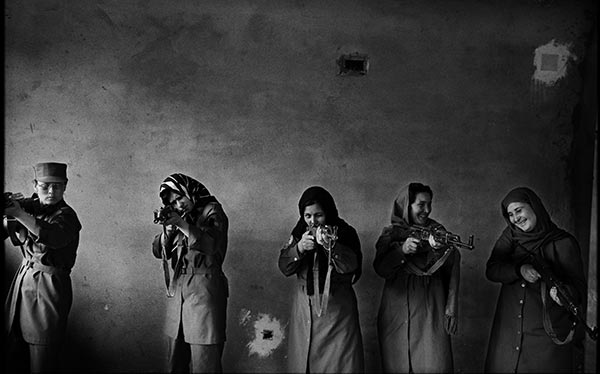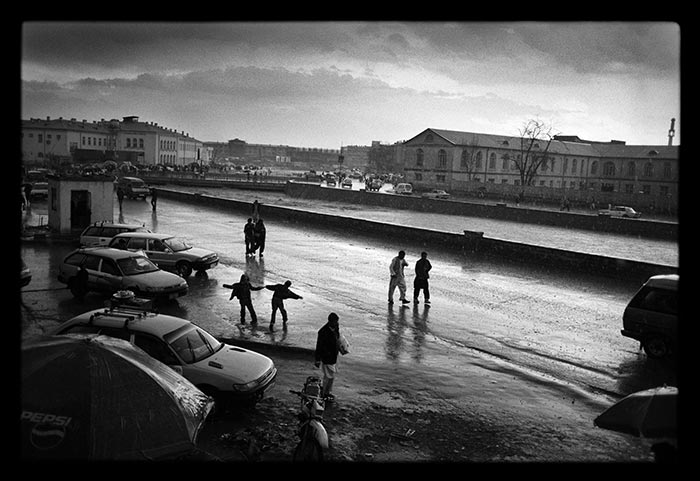
Somehow Helen had picked up the idea that there was such a thing as love and she had invested fully in it. Helen had summoned everything she was, every little tiny scrap of herself, and she’d handed it over to Cal and said: This is yours.
She said, Here’s a gift for you buddy.
Helen didn’t say be careful with it, because she knew he would be careful. She was twenty and you could say she didn’t know any better. But that was the way it had to be. She could not hold back. She wasn’t that kind of person; there was no holding back.
Somewhere Helen had picked up the idea that love was: you gave everything. It wasn’t just dumb luck that he’d known what the gift was worth because that’s why she gave it to him in the first place. She could tell he was the kind of guy who would know.
Her father-in-law, Dave O’Mara, had identified Cal’s body and told her over the phone.
I wanted to catch you, he’d said. She had known there wasn’t any hope. But she’d felt faint when she heard his voice. She’d had to hold on to the kitchen counter. She didn’t faint because she had the children in the house and the bath was running.
It gave me a turn, he’d said. I’ll tell you that much. There were long stretches in that phone call where neither of them said anything. Dave O’Mara wasn’t speaking because he didn’t know he wasn’t speaking.
He could see before him whatever he’d seen when he looked at his dead son, and he thought he was telling her all of that. But he was in his own kitchen staring silently at the floor. Looking at his dead son must have been like watching a movie where nothing moved. It was not a photograph because it had duration. It had to be lived through.
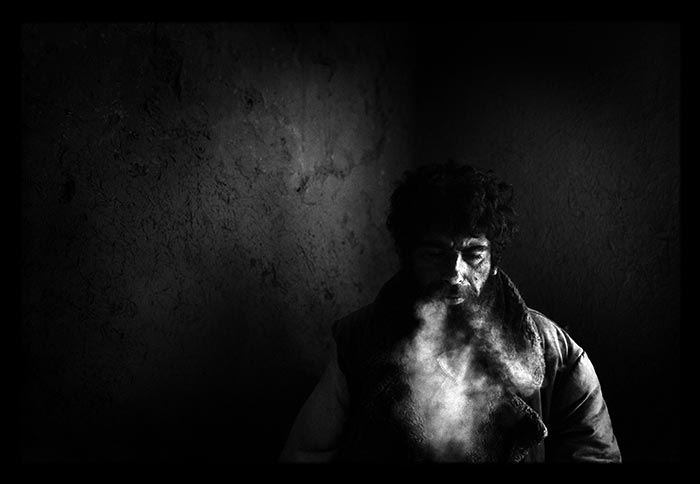
And Helen was trying not to faint because it would scare the living daylights out of the children.
Besides, she had known. She’d known the minute the bastard rig sank.
Dave had said, It was Cal.
Helen lost her peripheral vision. She could see a spot about the size of a dime in a field of black. She tried to focus on the surface of the kitchen table. It was a varnished pine table they’d bought at a yard sale and in that little circle she could see the grain of the wood and the glare of overhead light. She had willed the spot to open wider so she could take in the bowl with the apples and the side of the fridge and the linoleum and then the window and the garden. Her scalp was tingling and a drip of sweat ran from her hairline down her temple. Her face was damp with sweat as if she had been running.
Dave said they had bodies down there with just their ordinary clothes on and a few men who weren’t fully dressed like they’d just left their bunks and there were some who had their eyes open.
One man in particular, Dave said. Looked right at me. Draped in white sheets. He said they looked alive, those men. He half-expected them to move.
I can’t get over it, he said. Helen could only think of how frightened Cal must have been. He couldn’t swim. She had felt such a panic. She had wanted to know exactly what had happened to him. She had wanted that more than anything else.
Only twenty-two bodies, Dave said. She was in a panic as if something very bad was going to happen, but it had already happened. It was hard to take in that it had already happened. Why was she in a panic?
It was as if she had been split in half. Something bad was going to happen to her; and then there was the other her; the one that knew it had already happened. It was a mounting and useless panic and she did not want to faint. But she was being flooded with the truth. It wasn’t going to happen; it had already happened.
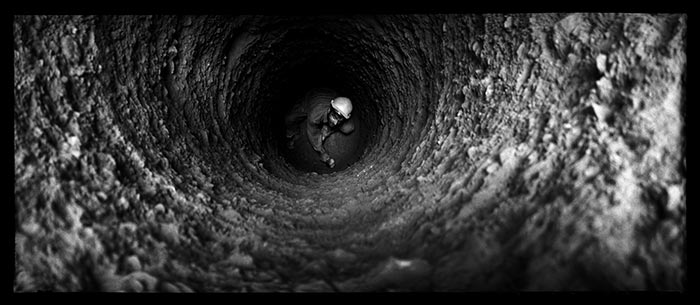
You don’t want to see him, Dave said. She was in the kitchen looking out the window over the backyard. She had the phone cord scrunched up in one hand and her other hand slipped a little on the arborite counter and made a squeak. The tap was dripping, sharp pings in the stainless steel sink. She pushed the faucet so the drip would hit a dishcloth. She watched the faucet shine with wetness and watched as the wetness gathered into a drop and it hung at the rim of the threaded washer and jiggled and fell and hit the cloth with absolute silence.
I wanted to catch you, her father-in-law said again. Before you left the house. Dave had called to spare her. He wanted to tell Helen there was no need for her to go. He seemed to want to talk.
I took hold of Cal’s hand, Dave said. His hand was there under the sheet. Had his wedding ring on. You’ll want that ring Helen and I’ll make sure you get it. I said to the man there, My son’s wife is going to want that ring. I took Cal’s hand and held on to it. I held on to his hand. I don’t think you want to see him Helen. I said the same thing to Meg. I said to his mother, I don’t think you should go over there. That’s all. That’s what I said to her. That’s all there is to it. Some of the bodies, I said. I said to Meg. I don’t think you want to see. The place is all a shambles. It’s orderly over there but there are a lot of bodies.
I said goodbye to him, Helen, Dave said. That may sound foolish.
He was silent for a while and Helen didn’t speak either. She could see through her window, over the back fence, the deep yellow square of light from her neighbour’s kitchen. The neighbour, she was some kind of actress, was at the sink washing dishes. Helen watched her putting plates in the rack. Then a man was standing beside her. The actress turned from the sink and they spoke. Not long, just a few words. The woman left the sink and followed the man into the dark hall at the back of the kitchen. Helen felt a welter of jealousy. The couple framed in all that yellow light, the white plate in her hands as she paused to listen, and the husband turning into the dark hallway.
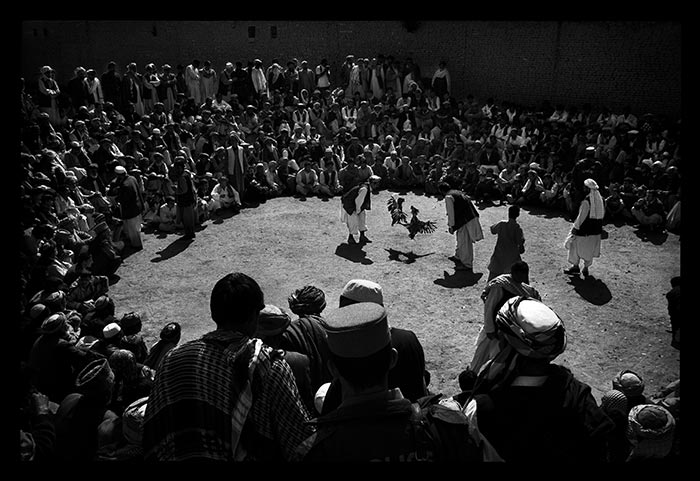
I don’t think we’re going to get over this one, Dave said. This one is a hard one. Meg is in there in the bedroom. She went in to lie down.
That doesn’t sound foolish, Helen said. Saying goodbye doesn’t sound foolish.
Dave sucked in air through his teeth the way someone does when they are lifting something heavy.
You don’t want to remember him that way, Dave had said. She heard a loud spank of water, a great gushing slap, and looked out into the hall. She had let the bath run over and the water had come through the ceiling. There was water everywhere. The children came out of the living room where they had been watching TV and stood at the end of the hall looking at her on the phone.
Mommy, they were screaming. The water poured down in fat ropes and thin sheets that tapered to a point and got fat again. Sheets of water that slapped the linoleum and she shouted, Get out of the way.
She told Dave she had to go. She ran up the stairs two at a time. When she came back downstairs the receiver was on the counter buzzing hard.
She would call her sister Louise to drive her there, she decided. She did not have to tell Dave or Meg she was going. She wanted to hold his hand too, no matter how cold it was.
There’s something in the mailbox, Helen said. A bright red envelope big enough to hold the lid of the mailbox up about an inch.
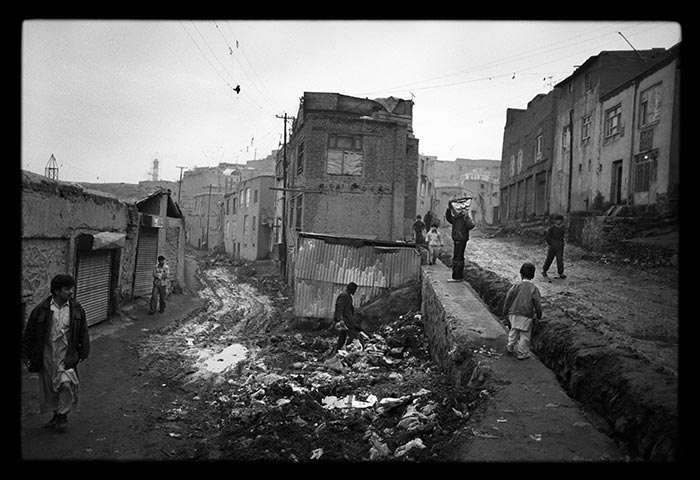
Louise was leaning forward, holding the wheel. She’d worn her fox fur hat and black suede coat and matching gloves and she had on dark lipstick. They had come from Pier 17 where the bodies were and Helen had not gone inside to see Cal’s body.
Louise had pulled into the parking lot and they just let the car idle. Helen couldn’t go inside. But she was glad to be there. Louise had picked her up and hadn’t said much and they’d just stayed there is all they did. They stayed for a while. The radio had been on and after some time Louise turned it off. She wasn’t in a hurry. She took off her hat and put down the visor and smoothed her hair and put the visor back up. They didn’t have to talk.
Louise reached over and opened the glove box and rooted around and there was a packet of tissues and she slit the plastic with her nail and tugged one out and Helen took it. Louise opened her purse and got a cigarette and pushed in the lighter and waited until the lighter glowed orange and popped out.
She lit the smoke and pushed the button so the window went down a crack and she blew the smoke out the window. She threw the cigarette outside into the snowbank.
Cancer sticks, she said. They watched an ambulance pull up and park and someone got out and went into the building and the door closed behind him. After a very long time a woman came out and there was a man with her and he had his arm around her. He brought her to over to a Buick and opened the door and she got in and he trotted around the front and got in himself and started the car and they drove off.
Helen said, Okay.
Okay?
Let’s go, Helen said.
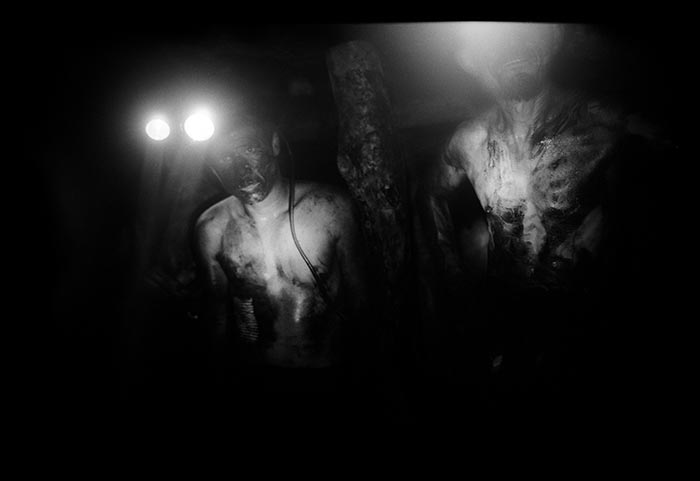
You’re not going in, Louise said.
I should get home, Helen said. She blew her nose as hard as she could.
Jesus, Louise, she said.
I know honey, Louise said. You’re my baby sister.
And now they were sitting in the car outside Helen’s front door. Louise’s husband was a car salesman and they’d always driven a Cadillac because they were big and safe and Louise liked a luxury car.
A pickup truck came up behind them and the road was narrow because it wasn’t plowed properly and the truck waited for them to move.
Louise watched him in the rear-view. She narrowed her eyes.
The guy tapped his horn once.
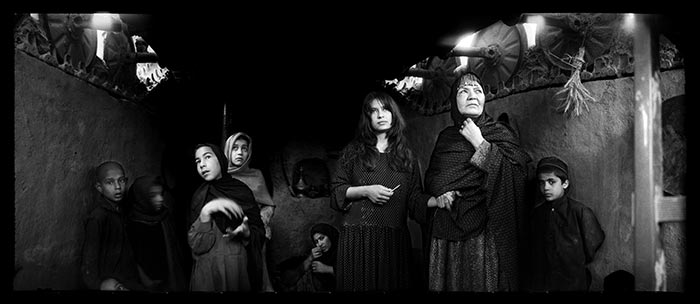
Go around us you bloody fool, Louise whispered. Then she pressed the button and her window rolled down and she put her hand out and waved him around. Her hand, outside the window, did two slow turns and she pointed with one finger. The finger looked stern and mocking in her black glove. She drew her hand back into the car. The cold air came in and all the noises of the street. She took two fingers of her glove in her teeth and pulled it off and then she tugged off the other glove, one finger at a time.
The driver of the pickup didn’t attempt to go around them because there wasn’t enough room. Only one side of the street had been plowed. Louise opened her purse with a loud snap and found the pack of cigarettes again without taking her eyes off the rear-view.
Look at that fool, she said. There was a group of teenagers coming down the hill, too. They had their coats open and their breath was visible in the air and they were bright cheeked and loud. A scrawny girl at the back was giggling, full of shrill giggles. She was running to catch up with her friends and her boots slapped loudly on the pavement.
Helen knew the mail in the mailbox was a Valentine from Cal. He always sent a card on Valentine’s Day. He liked to mark all the occasions with a card. He liked the card to arrive more or less on time.
The lighter popped and Louise lit the cigarette and she turned her head and blew smoke out onto the street. Then she tilted the mirror to watch the guy in the truck.
He pressed his hand into the horn. He kept the horn blaring for as long as he could and then he let up and then he pressed it again. There was traffic behind him now and he couldn’t back up. And he couldn’t go around. The kids coming down the hill had stopped and gently collided with each other, their heads all turned, trying to see what was going on.
I guess I better go on inside, Helen said. But she didn’t move. She felt like she couldn’t move. Or that she had moved, had gotten out of the car, had lived out the rest of her life and had died and was dead and was back in the car, a ghost, or something without musculature or bone. Something that could never move again.
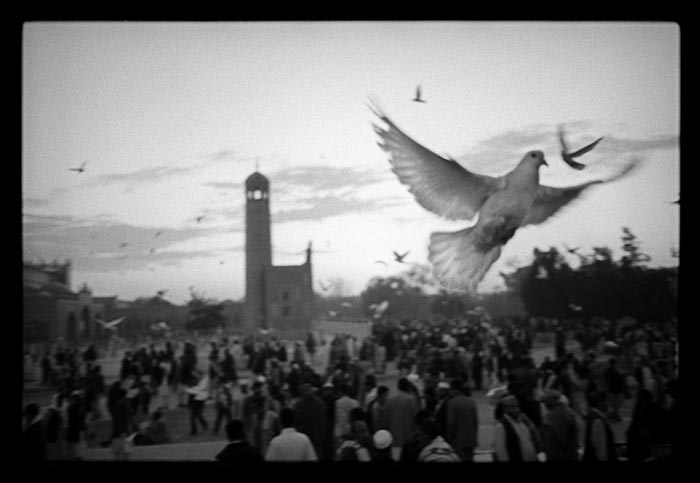
The guy was out of the truck now and he slammed his door. He was in a fury and he brought the flat of his hand down on the roof of Louise’s car and it made a hollow boom. He bent down to look Louise in the eye and his face was very close. But she kept looking straight ahead. She took a draw on her cigarette and blew smoke out at the windshield. He might have kissed her temple if he were a couple of inches closer. The man’s eyes were a pale watery hazel and he was bald, a pale face with high cheekbones and a weak chin and his lips were pressed tight.
You’re blocking the goddamn road, he said.
My sister’s husband was on the Ocean Ranger, Louise said. We were just up, identifying the body. But actually she didn’t go in.
Louise, Helen said. The man stood back from the window.
We’re just sitting here now because we’re worn out, Louise said. The man looked back at his truck.
I don’t even smoke, Louise told him. She was looking at the cigarette as if she didn’t know what it was. She dropped it out the window.
It’s a dirty habit, she said.
I should help you, the man said.
Oh, we’ll be fine, Louise said. Helen put her hand over Louise’s hand. Her sister was holding tight to the wheel. She always drove leaning forward slightly, gripping the wheel. She drove as if she required the seat belt to hold her back from something she wanted.
I’m going now, Louise, Helen said.
The man came around the front of the car and he opened Helen’s door for her and he held her by the elbow as if she were an old lady. Or like she was leaning on him. She was leaning because she had a feeling she couldn’t walk. She felt drunk. It took her a long time to find her keys in her purse. Finally he took the purse from her and dug out the keys and he opened the door and put the keys back in and he was standing there holding the purse. The traffic all down the road was backing up bit by bit and turning around and finding side streets. When the door was open Louise toot-tooted and drove off.
Helen let herself into the house and it was quiet. The kids had gone to school that morning. They must have discussed it amongst themselves but they didn’t wake Helen. They’d let her sleep. She took off her coat and hung it on the banister and she put her boots by the heater. The heat was off in the kitchen and she turned it on high. She put on the kettle and dropped a tea bag in a cup and she drank the tea without taking out the bag because she forgot to take it out. She had taken a butter knife from the drawer and it was lying on the table next to the envelope. There was a phone bill and some kind of flyer from a pizza shop. Then she just opened the red envelope.
There was a card with a picture of a big bouquet of red roses on the front. The words were in gold, swirling italics and it said For My Wife on Valentine’s Day. Inside there was a greeting card poem that didn’t rhyme about love. The poem touched on the meaning of a life and generosity and kindness and all the good times and on the back in extremely small print it said the card was a product of China. Cal had written over the top of the poem, My Love, and he’d signed it at the bottom, xoxo Cal.

